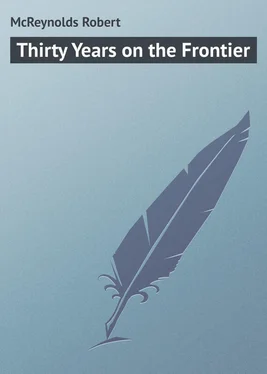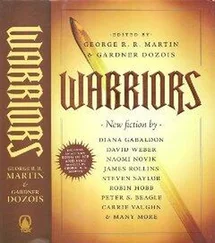Robert McReynolds - Thirty Years on the Frontier
Здесь есть возможность читать онлайн «Robert McReynolds - Thirty Years on the Frontier» — ознакомительный отрывок электронной книги совершенно бесплатно, а после прочтения отрывка купить полную версию. В некоторых случаях можно слушать аудио, скачать через торрент в формате fb2 и присутствует краткое содержание. Жанр: foreign_prose, на английском языке. Описание произведения, (предисловие) а так же отзывы посетителей доступны на портале библиотеки ЛибКат.
- Название:Thirty Years on the Frontier
- Автор:
- Жанр:
- Год:неизвестен
- ISBN:нет данных
- Рейтинг книги:4 / 5. Голосов: 1
-
Избранное:Добавить в избранное
- Отзывы:
-
Ваша оценка:
- 80
- 1
- 2
- 3
- 4
- 5
Thirty Years on the Frontier: краткое содержание, описание и аннотация
Предлагаем к чтению аннотацию, описание, краткое содержание или предисловие (зависит от того, что написал сам автор книги «Thirty Years on the Frontier»). Если вы не нашли необходимую информацию о книге — напишите в комментариях, мы постараемся отыскать её.
Thirty Years on the Frontier — читать онлайн ознакомительный отрывок
Ниже представлен текст книги, разбитый по страницам. Система сохранения места последней прочитанной страницы, позволяет с удобством читать онлайн бесплатно книгу «Thirty Years on the Frontier», без необходимости каждый раз заново искать на чём Вы остановились. Поставьте закладку, и сможете в любой момент перейти на страницу, на которой закончили чтение.
Интервал:
Закладка:
Robert McReynolds
Thirty Years on the Frontier
I
IN DAYS OF INNOCENCE
In the following pages I shall tell of much personal experience as well as important incidents which have come under my observation during thirty years on the frontier. As a cowboy, miner and pioneer, I have participated in many exciting events, none of which, however, caused me the prolonged grief that a certain bombshell affair did when I was a boy, resulting in a newspaper experience and habit of telling things, and eventually led to my coming West.
My grandfather’s plantation in Kentucky and nearly opposite the town of Newburgh, on the Indiana side, was as much my home as was my mother’s. She being a widow and having my brother and sister to care for, as well as myself, felt a relief from the responsibility of looking after me when I was at my grandfather’s home.
The plantation faced the Ohio River, the wooded part of which had been a camping ground for rebel soldiers, until they were driven out by the shells of a Yankee gunboat. While hunting pecans in these woods one day, I stumbled on to an unexploded bombshell, and, boylike, I wanted to see the thing go off. However, I was afraid to touch it until I had counseled with the Woods boys, whose father was a renter of a small tract of ground below the plantation. That night the three of us met and decided to explode the shell the following Sunday morning, after the folks had gone to church. I feigned a headache when grandmother wanted to take me in the carriage with them to church, but when I was satisfied they were well down the road, I hurried to the strip of forest a mile away, where the Woods boys were waiting. They had come in a rickety old buggy drawn by a white mule. It was in autumn and as the leaves were dry on the ground, we were afraid to kindle a fire, and decided to take the shell near the tobacco barn, around which we could hide and watch it go off. Neither of the boys would handle it, so I lifted it into the buggy; then they were afraid to ride with it, and it was left to me to lead the mule to the tobacco barn. I hitched the animal to a sapling near the barn, while the other boys gathered up some kindling, and we made a pile of old fence posts, and when I had laid the shell upon the log heap, we lit the kindling with a match and all ran behind the barn, forgetting all about the mule. The wood was dry and was soon all aflame. Every little while one of us would peek around the corner to see if the thing was not about ready to explode. We were getting impatient, when the mule gave a great “hee haw” that called our attention to his peril. It was his last “hee haw,” for in a second more the bomb exploded with a deafening noise, and fragments of the shell screamed like a panther in the air. We ran around to see the result of the explosion, and behold! it had spread that mule all over the side of the barn.
The things my grandfather said and did to me when he returned from church does not concern the public. But when he had finished, I was fully convinced that I was all to blame, and that I owed Mr. Woods $150 for his demolished mule.
Then followed long lectures from my mother and grandmother, and to add to my discomfiture was Mr. Woods’ lamentations and his expressed regrets that it was not me, instead of his mule, that was blown up.
I was the owner of an old musket with which I spent most of my time hunting rabbits, using small slugs of lead for shot, which I chopped up with a hatchet. Two weeks before the bombshell episode, I had found a musket-ball, and I concluded to try a man’s load in the gun on my next rabbit; I poured in a full charge of powder, but when I came to ram the ball home, it would go only half way down the barrel. I was afraid to shoot then, lest the gun might burst, and as I could neither get the ball out or farther down, I laid the barrel between two logs, tied a string to the trigger, and got behind a stump and pulled it off.
A few minutes later while I was examining my gun, grandfather came running out of the potato patch to find who was shooting at him. However, he was so thankful that matters were not worse, that I got off with a slight reprimand.
But this Sunday capped the climax. A council of my kinfolks was held that night, and decided that neither man nor beast was safe on that plantation if I remained. Their final verdict was that I should be sent to my mother’s home in Newburgh, and there to learn the printer’s trade, attend Frederick Dickerman’s night school, be made to pay for the mule, and my musket confiscated. I was paid $3 a week as printer’s devil to start with, one dollar of which I might spend for my clothes, fifty cents for tuition in the night school, one dollar and twenty-five cents for the mule debt, and the other twenty-five cents I might spend.
Grandfather was very careful to see that I saved the mule money, and I used to think he took a special delight in collecting it from mother, to whom I paid it every week.
It took me nearly three years in that printing office to get out of debt. I was now eighteen years of age.
Life in the printing office was too monotonous; I wanted a more exciting scene of action. I used to watch the great river steamers come and go, and wondered if I could hold any kind of a position on one of them, except carrying freight, when by accident one day there came an opportunity. The steamer “Dick Johnson” was lying at the wharf loading hogsheads of tobacco, when the freight clerk was injured by a fall of the stage plank. The captain wanted someone to take his place, and my schoolmaster recommended me. Here was a chance to put in practice the bookkeeping I had studied under him. It was what I wanted – I could now get a glimpse of the outside world.
The position on the “Dick Johnson” was a stepping-stone, for in another year I was the mate of the steamer “Rapidan,” plying between Florence, Alabama, and Evansville, Indiana, and had thirty negroes under my control.
It was historic country through which we passed. The trees on the islands near Pittsburgh Landing yet showed signs of shot and shell fired by federal gunboats. Ofttimes some passenger who had been a participant on one side or the other at Shiloh, would entertain his listeners for hours with stories of the fight, until some of us younger officers became imbued with the war spirit.
The autumn of 1875 had come when yellow fever broke out aboard our boat, and we lay in quarantine two miles below Savannah, Tennessee, for a month. I stayed with the boat until we were released, and then went to my home in Newburgh, ill with malarial fever.
Stories of rich gold finds in the Northwest had been circulated through the newspapers, and one day I resolved to try my luck. The things we believe we are doing for the last time, always cause a pang of sorrow, and as I packed my valise on Sunday afternoon to leave forever the home of childhood, my feelings can be better imagined than described. My grandparents came over from their Kentucky home to bid me good-bye. When I was ready to start, grandfather took from his pocket a roll of bills, and placing them in my hands, said: “Here, Mackey, is your mule money, and I have added interest enough to make the sum total $500. I paid Mr. Woods for his mule, but I wanted to teach you a lesson. Profit by it, and make good use of the money, and say, Mackey, whatever you do in life, never insult a blind man, never strike a cripple and never marry a fool.”
It was the last time I ever saw the noble old guardian of my youth. The first two of his parting injunctions I have religiously obeyed.
II
OUT FOR A FORTUNE
My first view of the Nebraska plains was the next morning after leaving Omaha, and I thought I never saw anything half so grand. The February sun threw its beams aslant the mighty sea of plain over which so many white covered wagons had toiled on their way to the then wild regions of the West.
Читать дальшеИнтервал:
Закладка:
Похожие книги на «Thirty Years on the Frontier»
Представляем Вашему вниманию похожие книги на «Thirty Years on the Frontier» списком для выбора. Мы отобрали схожую по названию и смыслу литературу в надежде предоставить читателям больше вариантов отыскать новые, интересные, ещё непрочитанные произведения.
Обсуждение, отзывы о книге «Thirty Years on the Frontier» и просто собственные мнения читателей. Оставьте ваши комментарии, напишите, что Вы думаете о произведении, его смысле или главных героях. Укажите что конкретно понравилось, а что нет, и почему Вы так считаете.












